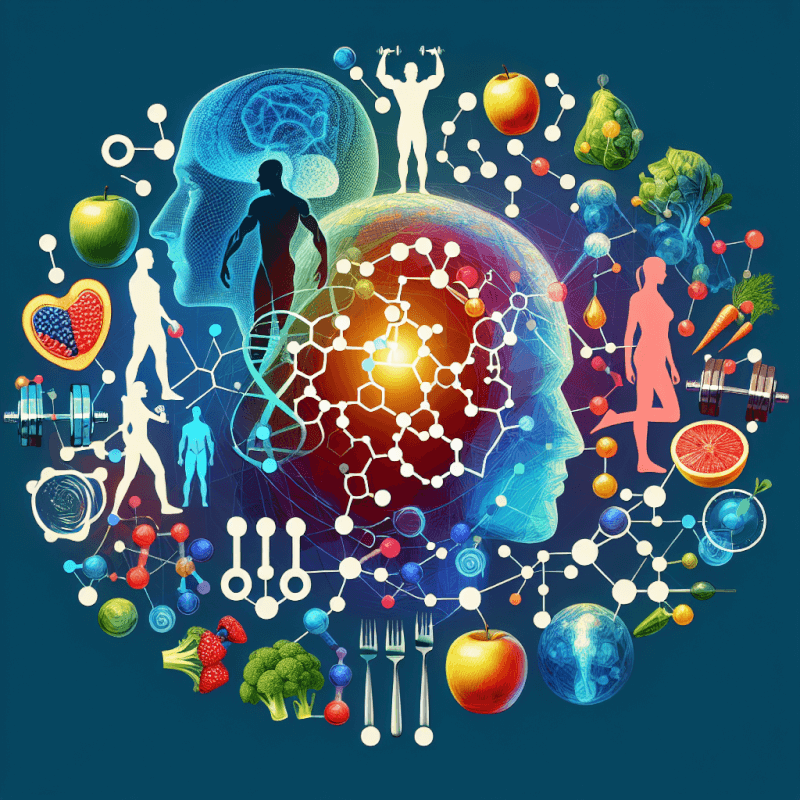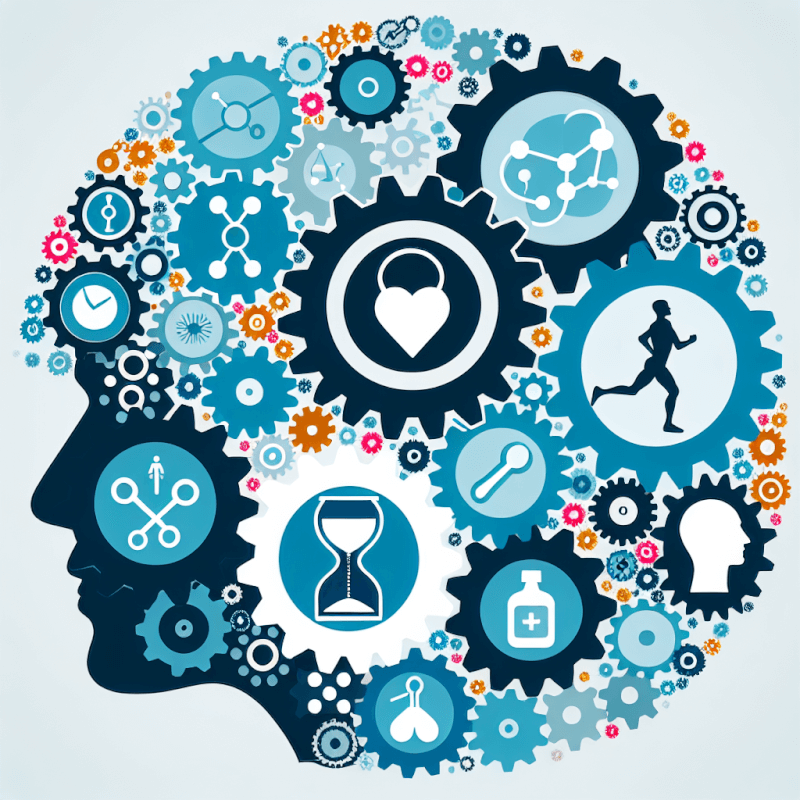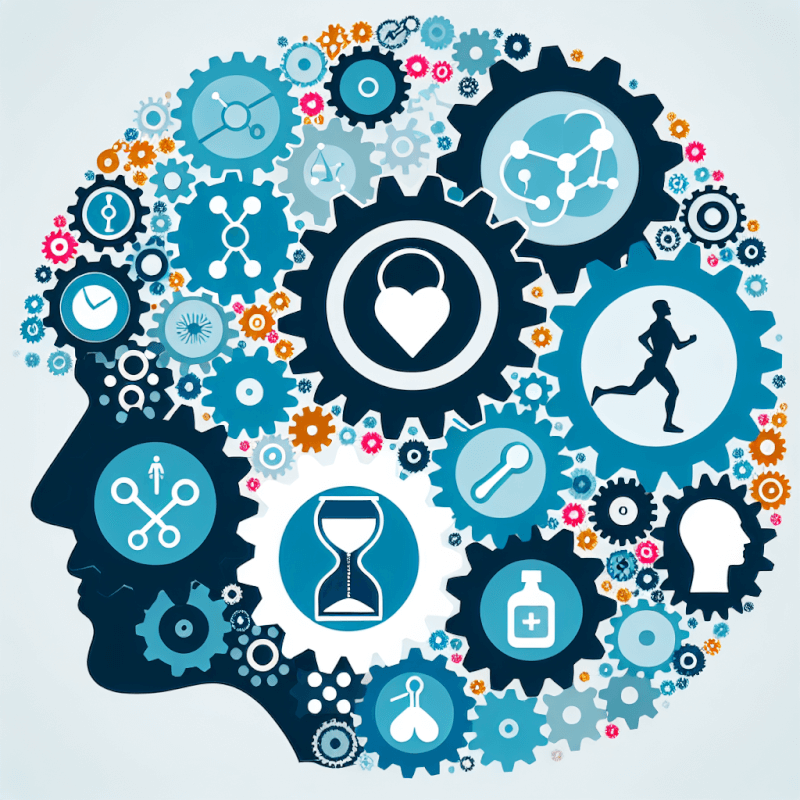As you age, your body goes through numerous changes, including hormonal fluctuations that can have a significant impact on your fitness and nutritional needs. These changes can affect various aspects of your physical and mental well-being, making it crucial to understand how they influence your overall health. In this article, we will explore the effects of hormonal change in aging on your fitness and nutrition, providing you with valuable insights and practical tips to help you maintain a healthy and balanced lifestyle. So, let’s dive in and discover how these hormonal changes can shape your journey towards optimal well-being.

Hormonal Changes in Aging
Overview of Hormonal Changes
As you age, your body undergoes various hormonal changes that can have significant effects on your overall health and well-being. These changes occur due to alterations in the functioning of the endocrine system, which is responsible for producing and regulating hormones in your body. While hormonal changes are a natural part of the aging process, they can have notable impacts on your fitness and nutrition.
Effects of Aging on Hormone Production
With advancing age, the production and regulation of hormones in your body start to decline. Some key hormones that are affected by aging include testosterone, estrogen, growth hormone, insulin, and thyroid hormones. These hormonal changes can have wide-ranging effects on different systems of your body, including your muscles, bones, metabolism, and appetite.
Impact on Fitness
Loss of Muscle Mass
One of the noticeable effects of hormonal changes in aging is the loss of muscle mass, a condition known as sarcopenia. The decline in anabolic hormones, such as testosterone and growth hormone, contributes to the reduction in muscle protein synthesis, leading to muscle loss. This loss of muscle mass can negatively impact your overall fitness, strength, and ability to perform physical activities.
Reduced Strength and Stamina
In addition to muscle mass loss, hormonal changes in aging can also result in reduced strength and stamina. Hormones like testosterone play a crucial role in maintaining muscle strength and endurance. As their levels decline, you may experience a decline in your physical capabilities, making it challenging to engage in activities that require strength and stamina.
Increased Fat Accumulation
Hormonal changes in aging can also lead to an increase in fat accumulation, especially around the abdomen. As estrogen levels decline in women and testosterone levels decline in men, there is a shift in fat storage and distribution, favoring abdominal obesity. This increase in fat accumulation can have detrimental effects on your overall fitness and increase the risk of metabolic conditions such as diabetes and heart disease.
Decreased Bone Density
Another significant impact of hormonal changes in aging is decreased bone density, which can lead to an increased risk of osteoporosis and fractures. Estrogen and testosterone are essential for maintaining bone health, and their decline with age can result in a decrease in bone mineral density. This makes your bones more fragile and susceptible to fractures, compromising your overall fitness and mobility.
Slower Metabolism
Hormonal changes in aging can also contribute to a slower metabolism, making weight management more challenging. As the production of thyroid hormones decreases, your metabolic rate can slow down, leading to weight gain or difficulty losing weight. A slower metabolism can affect your overall fitness and make it harder to maintain a healthy body weight.

Impact on Nutrition
Changes in Appetite
Hormonal changes in aging can affect your appetite, leading to changes in your eating patterns. The decline in hormones like leptin and ghrelin, which are involved in appetite regulation, can result in altered hunger and fullness signals. This can lead to decreased appetite, loss of interest in food, or increased cravings, ultimately impacting your nutritional intake.
Alterations in Nutrient Absorption
The aging process can also affect your body’s ability to absorb and utilize nutrients from food. Digestive system changes, such as decreased stomach acid production and a slower gut transit time, can impact the absorption of essential nutrients like vitamins, minerals, and macronutrients. These alterations can lead to nutrient deficiencies and have implications for your overall nutritional status.
Increased Risk of Malnutrition
Hormonal changes in aging, combined with alterations in appetite and nutrient absorption, can increase the risk of malnutrition. Malnutrition can occur due to inadequate nutrient intake, poor absorption, or improper utilization of nutrients. This can have detrimental effects on your overall health, immune function, and muscle and bone strength.
Effect on Body Composition
The hormonal changes in aging can also affect your body composition, specifically the ratio of muscle to fat mass. As mentioned earlier, there is a loss of muscle mass and an increase in fat accumulation, which can alter your body composition. This shift in body composition can have implications for your fitness, metabolic health, and overall well-being.
Influence on Eating Patterns
Hormonal changes in aging can influence your eating patterns and food choices. The decline in hormones like estrogen and testosterone can affect your taste preferences and sensory perceptions, leading to a change in the types of foods you prefer. Additionally, changes in appetite and hormonal regulation can impact meal timings, portion sizes, and overall dietary habits.
Hormones and Exercise
Role of Hormones in Exercise Performance
Hormones play a critical role in exercise performance, as they regulate various physiological processes that are essential for optimal fitness. Testosterone, for example, is associated with increased muscle strength and protein synthesis, which can enhance your exercise capacity. Growth hormone plays a role in muscle repair and recovery, while insulin helps transport glucose into cells for energy production during exercise.
Effects of Hormonal Imbalance on Exercise
Hormonal imbalances resulting from aging can have significant effects on exercise performance. The decline in anabolic hormones such as testosterone and growth hormone can lead to decreased muscle strength, endurance, and recovery. Additionally, reduced insulin sensitivity and impaired glucose regulation can affect your energy levels during exercise, making it more challenging to sustain high-intensity workouts.
Strategies to Optimize Hormonal Balance for Exercise
While hormonal changes in aging are inevitable, there are strategies you can implement to optimize hormonal balance for exercise. Regular physical activity, particularly resistance training, can help stimulate hormone production and promote muscle strength and growth. Proper nutrition, including an adequate intake of protein, vitamins, and minerals, is also essential for supporting hormonal balance and optimizing exercise performance. Additionally, managing stress levels, getting enough sleep, and maintaining a healthy weight can all contribute to maintaining optimal hormone levels for fitness.

Endocrine System and Metabolism
Endocrine System and Metabolic Regulation
The endocrine system plays a crucial role in regulating your metabolism. Hormones such as insulin, thyroid hormones, and cortisol are involved in various metabolic processes, including energy expenditure, glucose regulation, and fat metabolism. As hormonal changes occur with aging, the regulation of these metabolic processes can be disrupted, leading to metabolic imbalances and altered metabolic rates.
Hormonal Changes and Metabolic Rate
Hormonal changes in aging can contribute to a decrease in metabolic rate, making it more challenging to maintain a healthy body weight. The decline in thyroid hormones and changes in insulin sensitivity can slow down your metabolism, reducing the number of calories your body burns at rest. This can lead to weight gain or difficulty losing weight, making it important to focus on maintaining a healthy diet and engaging in regular physical activity.
Alterations in Glucose and Insulin Regulation
Another crucial aspect of hormonal changes in aging is the alteration in glucose and insulin regulation. Insulin resistance, which refers to decreased sensitivity to insulin, becomes more prevalent with age. This can lead to impaired glucose metabolism and an increased risk of developing conditions such as type 2 diabetes. Maintaining a balanced diet, engaging in regular exercise, and managing stress levels can help optimize glucose and insulin regulation, supporting metabolic health.
Hormonal Changes and Muscle Mass
Decline in Anabolic Hormones
Hormonal changes in aging contribute to a decline in anabolic hormones, such as testosterone, growth hormone, and insulin-like growth factor 1 (IGF-1). These hormones play a crucial role in muscle protein synthesis, which is essential for muscle growth and maintenance. The decline in anabolic hormones with age can result in a decrease in muscle mass and strength, making it important to implement strategies to preserve and build muscle mass.
Effects on Muscle Protein Synthesis
The decline in anabolic hormones, coupled with age-related changes in muscle protein turnover, can lead to impaired muscle protein synthesis. Muscle protein synthesis is the process by which new muscle proteins are generated, promoting muscle growth and repair. The reduction in muscle protein synthesis with aging can contribute to muscle wasting, increased muscle breakdown, and decreased muscle strength and function.
Strategies to Preserve and Build Muscle Mass
To preserve and build muscle mass in the face of hormonal changes in aging, several strategies can be implemented. Regular resistance training exercises, such as weightlifting or bodyweight exercises, can help stimulate muscle protein synthesis and promote muscle growth. Consuming an adequate amount of high-quality protein in your diet is also essential for supporting muscle protein synthesis. Additionally, maintaining a balanced and nutrient-dense diet, managing stress levels, and getting enough sleep can all contribute to preserving and building muscle mass.

Hormonal Changes and Bone Health
Impacts on Bone Mineral Density
Hormonal changes in aging can have significant impacts on bone health and density. Estrogen and testosterone play key roles in maintaining bone density and preventing the development of osteoporosis. As these hormone levels decline with age, the rate of bone formation decreases, leading to a greater decline in bone density and an increased risk of fractures.
Increased Risk of Osteoporosis
The decline in estrogen and testosterone levels with aging increases the risk of developing osteoporosis, a condition characterized by low bone density and increased fragility. Osteoporosis can make your bones more susceptible to fractures, reducing your mobility and overall quality of life. It is important to take steps to support bone health, such as engaging in weight-bearing exercises, consuming calcium-rich foods, and considering hormonal replacement therapy (HRT) for postmenopausal women.
Role of Hormonal Replacement Therapy (HRT)
Hormonal replacement therapy (HRT) is often prescribed to postmenopausal women to replace estrogen and, in some cases, testosterone. HRT can help mitigate the effects of hormonal changes on bone health by maintaining or increasing bone density. However, HRT is not without its risks and should be prescribed and monitored by a healthcare professional based on individual needs and considerations.
Hormonal Changes and Fat Distribution
Shifts in Fat Storage and Distribution
Hormonal changes in aging can result in shifts in fat storage and distribution throughout the body. As estrogen levels decline in women and testosterone levels decline in men, there is a tendency for fat to be stored more predominantly in the abdominal region. This increase in abdominal obesity can have adverse effects on overall health and increase the risk of metabolic conditions such as diabetes and cardiovascular diseases.
Effect on Abdominal Obesity
The increase in abdominal obesity resulting from hormonal changes in aging is associated with an increased risk of metabolic syndrome. Metabolic syndrome is a cluster of conditions, including high blood pressure, high blood sugar levels, abnormal cholesterol levels, and excess abdominal fat, that increase the risk of heart disease, stroke, and diabetes. Managing hormonal changes through lifestyle modifications, such as regular exercise and a balanced diet, is crucial in mitigating the effects of abdominal obesity and reducing the risk of metabolic syndrome.
Influence of Hormonal Balance on Metabolic Syndrome
Maintaining hormonal balance through lifestyle modifications can influence the development and progression of metabolic syndrome. Adequate physical activity, healthy eating habits, and stress management can help regulate hormone levels and promote a healthy body composition, reducing the risk of metabolic syndrome. It is important to prioritize these lifestyle factors to optimize hormonal balance and overall metabolic health.

Hormonal Changes, Appetite, and Satiety
Leptin and Ghrelin Levels
Hormonal changes in aging can impact the levels of appetite-regulating hormones, such as leptin and ghrelin. Leptin is a hormone that signals fullness and satiety, while ghrelin is responsible for stimulating hunger and increasing appetite. As you age, the levels of leptin may become dysregulated, leading to decreased sensitivity to fullness signals. Additionally, ghrelin levels may become imbalanced, leading to an increased appetite and potential overeating.
Altered Hunger and Fullness Signals
The hormonal changes in aging can result in alterations in the hunger and fullness signals that your body receives. This can lead to changes in appetite, such as decreased satiety after meals or increased cravings and snacking between meals. It is important to be mindful of these changes and focus on listening to your body’s hunger and fullness cues to maintain a balanced and nutritious diet.
Impact on Weight Management
The hormonal changes in aging, combined with alterations in appetite regulation, can have implications for weight management. The decrease in sensitivity to fullness signals and increased appetite can make it more challenging to maintain a healthy body weight. It is essential to be mindful of your eating habits, choose nutrient-dense foods, and engage in regular physical activity to support weight management and overall well-being.
Implications for Nutrient Absorption
Digestive System Changes
The aging process can bring about changes in your digestive system, which can affect the absorption of nutrients from food. These changes can include decreased production of stomach acid, a slower gut transit time, and a decrease in the efficiency of nutrient absorption processes. These alterations in the digestive system can impact the availability and utilization of essential nutrients.
Effect on Micronutrient and Macronutrient Absorption
Hormonal changes in aging, combined with digestive system changes, can affect the absorption of both micronutrients and macronutrients. Micronutrients, such as vitamins and minerals, play vital roles in various physiological processes and are required in small amounts by your body. Hormonal changes and alterations in nutrient absorption may increase the risk of micronutrient deficiencies. Similarly, changes in the digestive system can affect the absorption of macronutrients, such as carbohydrates, proteins, and fats, leading to potential imbalances in overall nutrient intake.
Strategies to Enhance Nutrient Utilization
To enhance nutrient utilization and support overall health in the face of hormonal changes in aging, several strategies can be implemented. Consuming a varied and balanced diet that includes a wide range of nutrient-dense foods can help ensure an adequate intake of essential vitamins, minerals, and macronutrients. Focusing on digestion and gut health by eating slowly, chewing food thoroughly, and incorporating probiotic-rich foods can also support optimal nutrient absorption. Additionally, regular physical activity and managing stress levels can help optimize nutrient utilization and overall wellness.
In conclusion, hormonal changes in aging can have significant impacts on your fitness and nutrition. From loss of muscle mass and reduced strength to alterations in appetite and changes in bone density, hormonal changes can affect various aspects of your overall health and well-being. By understanding these effects and implementing strategies to optimize hormonal balance, such as regular exercise, healthy eating habits, and stress management, you can support your fitness and nutrition goals as you age.


